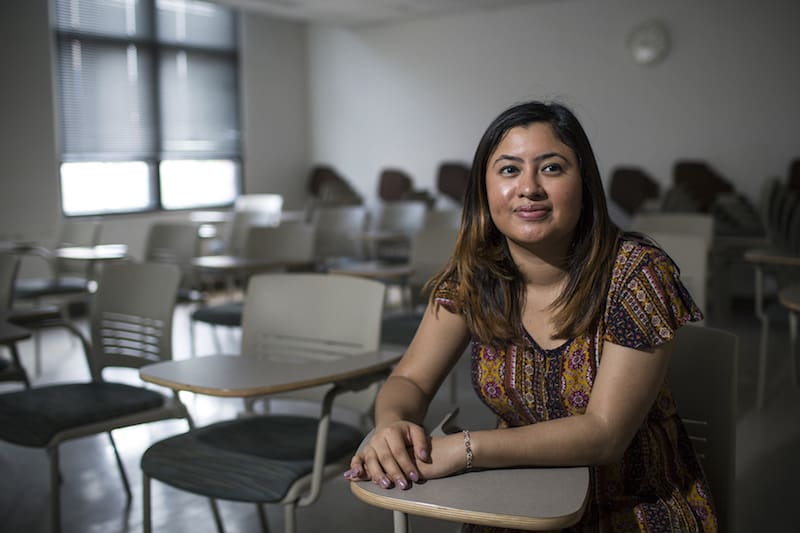Dora Gonzalez jokes that she grew up trilingual: English, Mexican Spanish, and Honduran Spanish.
“I would hear Honduran Spanish from my mom and Mexican Spanish from my dad. I didn’t realize they were two quite different ways of speaking Spanish until I used Honduran expressions when talking to someone from Mexico!” she says.
Gonzalez’s parents, each in their own Spanish style, shared with her their stories of immigration to the United States and what it was like back home. But there was something that they never discussed openly.
“I don’t think I ever had a sit-down conversation with my parents where they told me they were undocumented. It was always through involvement in the legal process that I figured it out, because we were always going to lawyers. And my dad got deported to Mexico twice, one time when I was younger, and another time before I came to college,” she says.
Gonzalez, now an honors social work senior at UT Austin with a passion for research, wants to help families like hers.
“I became involved in research as a sophomore and have since continued participating in projects that primarily give voice to underrepresented populations. I want to better understand and advocate for the needs of undocumented communities here in Texas,” she explains.

“Dora was a research assistant in a project for which we interviewed undocumented Latino parents about their lives in the United States,” says Jennifer Scott, a researcher with the School of Social Work’s Child & Family Research Institute. “Even when we sat in HEB for hours trying to track down just one more interview, Dora was unfazed. Her commitment to the immigrant community, and the quiet and intense attention she pays to conversations make her an excellent advocate and researcher.”
During the interviews for the project, Gonzalez asked parents about everything from their crossing experience to parenting practices in their country of origin versus the United States to their economic situation, what was it like to live in Texas, and if they had plans in place for their families in case they were deported.
The results of the study had been published here, but Gonzalez used the collected data for a separate project she did as an Undergraduate Research Fellow.
“My focus was on what makes people go through all these difficulties, survive, and even thrive in this negative and sometimes aggressive system, and what drives them,” she says of her project, which is titled El sueño dorado (“The golden dream,” in Spanish).
Social workers have a word for the drive that Gonzalez found in immigrant parents: resilience, or the ability to become strong, healthy, or successful again after something bad happens. Through her research project, Gonzalez wanted to understand the causes of daily stress for immigrant parents as well as the coping mechanisms that allowed them to manage such stress and become resilient.
“In my findings I saw this duality between immigrant parents having a realistic outlook and not being consumed by negativity but also avoiding to talk about what they go through or what might happen if the authorities find out they are undocumented. Although people are not overcome with negativity, which is a good thing, that also means that they are not putting plans in place,” Gonzalez explains.
She pauses for a moment when asked what was it like to interview parents like hers.
“Doing the interviews was difficult. It was sad for me to see other parents in the same situations my own parents were, or to hear them talking about the negative aspects of being an undocumented parent. It was really heartbreaking,” she answers.
If social work has taught her anything, she adds, is the value of self-reflecting and processing her thoughts and feelings. When doing the interviews, in fact, Gonzalez made sure she put in place her own coping mechanism.
“Thankfully I had Jen Scott! She was managing the project, and we definitely debriefed after every interview. That really helped because otherwise, the feelings stay with you.”
Gonzalez is graduating this May as a College Scholar with a double degree in social work and American Studies. She laughs softly at the comment that her immigrant parents must be very proud of her academic achievements in the United States.
“I would hope so!” she says. “They are just like, ‘Good, you are doing what you are supposed to do.’ But I do know that they talk about me with pride to friends and family.”
Posted May 17, 2016. By Andrea Campetella. Photos by Martin do Nascimento.

